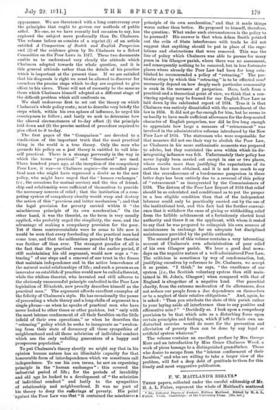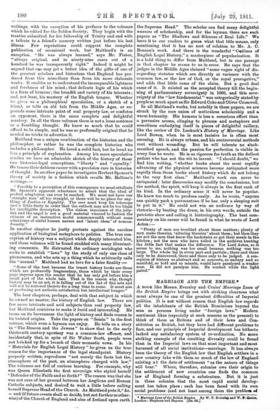. F. W. MAITLAND'S ESSAYS.* THESE papers, collected under the
careful editorship of Mr. EL A. L. Fisher, represent the whole of Maitland's scattered • The CoUected Papers of Frederic William Maitland. Edited by IL Fisher. 3 vols. Cambridge : at the University Press. 130s. net.] writings, with the exception of his prefaces to the volumes which he edited for the Selden Society. They begin with the treatise submitted for his fellowship of Trinity and end with a tribute to a friend's memory written just before his last illness. Few reputations could support the complete publication of occasional work, but Maitland's is an exception. "He was always learned," says Mr. Fisher, "always original, and in ninety-nine cases out of a hundred he was transparently right." Indeed it might be argued that oue may get a better idea of the gifts of one of the greatest scholars and historians that England has pro- duced from this miscellany than from his more elaborate works. It enables us to understand the incomparable lightness and freshness of his mind ; that delicate logic of his which is a form of humour ; the breadth and variety of his interests ; and, not least, his mastery of the English tongue. Whether he gives 113 a philosophical speculation, or a sketch of a friend, or tells an old tale from the Middle Ages, or ex- pounds some intricate point of real property law, or confutes an opponent, there is the same complete and delightful mastery. In all the three volumes there is not a loose sentence or a fumbling thought. He knew so much that he could afford to be simple, and he was so profoundly original that he needed no tricks to advertise it.
Maitland was a unique combination of the historian and the philosopher, or rather he was the complete historian who includes a philosopher. He loved a solid fact, but be loved no less a principle of explanation. Among his more speculative studies we have an admirable sketch of the history of those two historieo-legal conceptions, " liberty " and " equality.' lie t races their dubious career with a precision rare in histories of thought.. In another. paper he investigates Herbert Spencer's theory of society in a fashion which recalls Mr. Balfour's writings:— "Possibly to a perception of this consequence we must attribute Mr. Spencer's apparent reluctance to admit that the ideal of perfect adaptation can ever be reached. We must not have our . straight man' all too straight, or there will be no place for any- thing of Justice or Equality. The seer must keep his telescope just a little dusty in order that the outlook may not be too blank for intelligible description. The sinless innocence of the jelly- fish and the angel is not a good material whereof to fashion the citizens of an instructive model commonwealth without some admixture of sinful human nature and 'latent ideas' of noncon- formity."
In another chapter he justly protests against the careless application of biological metaphors to politics. The true con- ception of history was a subject which deeply interested him, and these volumes will be found studded with many illuminat- ing comments. He distrusted the ordinary sociologist who seeks to establish " laws" by the study of only one class of phenomena, and who sets up a thing which he arbitrarily calls the "normal." Maitland had no love for a false finality :— " Some of the best because the truest history books are those which are professedly fragmentary, those which by their every page impress upon the reader that he has only got before him a small part of the whole tale. That is the reason why, though history may be an art, it is falling out of the list of fine arts and will not be restored thereto for a long time to come. It must aim at producing not [esthetic satisfaction but intellectual hunger."
The hest chapters, perhaps, deal with that subject in which he owned no master, the history of English law. There are few more intricate and arid subjects than real property law, but Maitland contrives to make it lucid and interesting. He turns on its barrenness the light of history and finds reason in its twisted origins. Take the papers on " Seisin" in the first volume, which even a layman can enjoy. He tells us a story in " The Deacon and the Jewess " to show that in the early thirteenth century apostasy was a common-law offence, and incidentally that, in spite of Sir Walter Scott, people were not bricked up for a breach of their monastic vows. In his " Materials for English Legal History " he gives us the true reason for the importance of the legal standpoint. History properly written, reproduces "not merely the facts but the, atmosphere of the past, an atmosphere charged with law." The volumes are full of curious learning. For example, why was Queen Elizabeth the first sovereign who styled herself "Defender of the Faith and so forth?" The reason was that she was not sure of her ground between her Anglican and Roman Catholic subjects, and desired to wait a little before calling herself Supreme Head of the Church. As Maitland puts it," &c. — and (if future events shall so decide, but not further orother- wise) of the Church of England and also of Ireland upon earth
the Supreme Head." The scholar can find many delightful nuances of scholarship, and for the layman there are finch papers as " The Shallows and Silences of Real Life." We
leave it to our readers to guess what that title means, only mentioning that it has no sort of relation to Mr. A. C. Benson's work. And there is the wonderful " Outlines of English Legal History," a masterpiece of popularization. It
is a bold thing to differ from Maitland, but in one passage in that chapter he seems to us in error. He says that the judges in the Middle Ages claimed "some vague right of dis- regarding statutes which are directly at variance with the common law, or the law of God, or the royal prerogative," and adds that little came of the claim. But a good deal came of it. It existed as the accepted theory till the begin- ning of parliamentary sovereignty in 1660, and this sove- reignty of the " law fundamental " was categorically stated by people so much apart as Sir Edward Coke and Oliver Cromwell.
In all Maitland's works, but notably in these papers, we are struck by the rare union of meticulous scholarship and a warm humanity. His humour is less a conscious effort than a pervasive aroma, clinging to phrases and metaphors and sometimes embodying itself in pieces of delightful raillery, like the review of Dr. Luckock's History of Marriage. Like Lord Bowen, when he is most incisive he is often most amusing. He is always urbane, and his controversial methods rout without wounding. But he will tolerate no slack- mouthed speech, and the passion for perfection is visible in every line he wrote. He is as rigorous for truth as the dullest pedant who has not the wit to invent. "I should doubt," we find him writing, "whether books about the most rapidly advancing of the physical sciences become antiquated more rapidly than those books about history which do not belong to the very first class." Maitland's work can never be antiquated : later discoveries may modify the conclusions, but the method, the spirit, will keep it always in the first rank of its kind. In the ordinary sense it will never be popular.
He knew too much to produce easily. As be wrote, "anyone can quickly pack a portmanteau if be has only a sleeping suit to put in it." He could not win an audience by way of rhetoric—by beating the drum, in his own words, outside the patriotic show and calling it historiography. The best com- mentary on his career will be found in what be wrote of Lord Acton :-
"Plenty of men are troubled about these matters; plenty of men make theories, 'alluring theories' about them; but then they are not the men that know the backstairs or get their meals in the kitchen ; not the men who have toiled in the archives hunting the little fact that makes the difference. For Lord Acton, so it seems to me, nothing was too small because nothing was too large. The whole lay in every part and particle ; there and there only to be discovered, there and there only to be judged. A con- ception of history so abstract and so concrete, so unitary and so manifold, so bold and so minute, would have paralyzed a weaker man. It did not paralyze him. He worked while the light lasted."







































 Previous page
Previous page